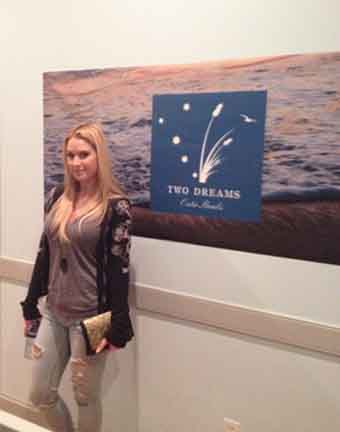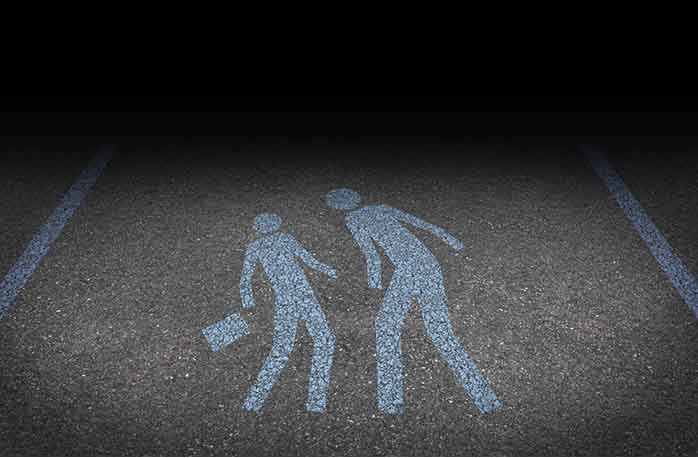VOLUME XXII / OCT 2014
Two Dreams is a wellness program led by Andrea G. Barthwell, MD, FASAM that provides individualized care for those who dream of recovering a healthy lifestyle.
NOTE FROM DR. B.
Two Dreams has been very busy this past month, and we have several more exciting upcoming events to announce! I will be presenting today, November 7th, at the Oklahoma State University 31st Primary Care Update. I will also be speaking next Monday, November 10th, at the Township Officials of Illinois 106th Annual Educational Conference, and will be discussing impact of Marijuana on today’s youth and other recent youth drug trends.
Our October Quarterly Training Event co-hosted with Caron Treatment Centers was a great success! Thank you to everyone who attended, and thank you to Rev. Jack Abel, MDiv, MBA, for putting together an extremely engaging presentation. Thank you also to Tara Conner, former Miss USA title, for visiting the Outer Banks clients and sharing your inspiring story this past month.
VOLUME XXII / OCT 2014
Two Dreams is a wellness program led by Andrea G. Barthwell, MD, FASAM that provides individualized care for those who dream of recovering a healthy lifestyle.
NOTE FROM DR. B.
Two Dreams has been very busy this past month, and we have several more exciting upcoming events to announce! I will be presenting today, November 7th, at the Oklahoma State University 31st Primary Care Update. I will also be speaking next Monday, November 10th, at the Township Officials of Illinois 106th Annual Educational Conference, and will be discussing impact of Marijuana on today’s youth and other recent youth drug trends.
Our October Quarterly Training Event co-hosted with Caron Treatment Centers was a great success! Thank you to everyone who attended, and thank you to Rev. Jack Abel, MDiv, MBA, for putting together an extremely engaging presentation. Thank you also to Tara Conner, former Miss USA title, for visiting the Outer Banks clients and sharing your inspiring story this past month.
We will be having our next Catered Networking Event next Wednesday, November 12th, at the Florentine Restaurant in downtown Chicago. There is still time to register! Call (504) 510-2331 for more information or register online at Two Dreams Chicago CEU Events
MONTHLY PROMISE
#10: “Fear of People and Economic Security will Leave Us”
By: Brett Dunning, TDOB Clinical Director
My initial reaction to this month’s promise was, “I was not fearful of people”. As I reflect back, I can see how I am utilizing the ugly art of minimization. The truth is that my high anxiety in active addiction (which I medicated with mood altering substances) and in early recovery was a direct gauge of my fear of others. The beautiful art of surrender led me to the awareness that not only was I powerless over mood altering substances, but also I was powerless over my untruthfulness, my insecurities, my fears, and most importantly how others viewed me. I was consumed by how others viewed me, and when they did not view me in the manner I wanted them to, I would say to myself, “I don’t need them anyway”.
This is another vicious cycle that supported my addiction. The hardest part of my recovery was that I had to become truthful of how I viewed myself. I had to adopt recovery principles in early recovery to protect myself from myself. When I started thinking, behaving, and feeling emotionally stable at two years sober, I began to incorporate my own personal moral principles, which supported my recovery. I wasn’t able to do this until I knew who I truly was.
One example of this occurred this past Monday, there was a sick kitten lying on the steps of Two Dreams Outer Banks office. I picked him up, took him in the office, went to the grocery store, and bought an eye dropper and Similac. Throughout the day I was typing on the computer, making phone calls, and feeding the kitten. At three o’clock the kitten was not getting better and our case manager Kate took him to the veterinarian. The kitten didn’t make it through the night but I was true to my own principles (or moral code) which was instilled in me from my early recovery and the utilization of 12-Step principles.
“Fear of Economic Insecurity”
In recovery I viewed the second half of this month’s promise as, “I’m going to be rich”. I remember vividly sitting in a 12-Step meeting allowing my ego to accept the fact that if I get sober I will be rich, then my insecurities would tell me, “you’re not getting rich and you probably will not stay sober” (Ugggh, the ups and downs of early recovery). The second half of this of this month’s promise provoked fears in me that I could not handle in early recovery; three years ago I believed this promise would never materialize in my life. My higher power did for me what I could not do for myself.
As I mentioned in the first half of this promise, I did not know myself and was not true to myself until I was four years sober. In early recovery material items and financial security were things I strived for. I would work hard to save money because of financial insecurity, and then I would be emotionally insecure and spend my savings on material items which I thought would make me feel better. It was another vicious cycle, after I bought these material items I knew they would not relieve me of my problems and I felt more guilt and shame.
Today I realize my perception of this promise was the problem. I am more comfortable with myself and know material items will not provide lasting happiness. I do not define “economic security as having a certain amount in the bank account. I am not mentally governed by the fear of debt or the expectation of riches. The honest truth in this promise coming true in my life lies in the fact that I can distinguish between my “wants” and my “needs” because I am comfortable with whom I am, not what I have. The fear of economic insecurity continues to minimize as I do the internal work necessary to recover from the disease of addiction. I am a person amongst people today, I have bills and debts that are manageable and do not manage me, the fear of economic insecurity has left me and it does not mean that I am rich.
I was true to the person my higher power wants me to be. I am not fearful of others today because I am true to myself. People do not sway me in one direction or the other because I am not overly concerned with what others think of me. I have a new confidence today because of a healthy moral code based on recovery principles. My only concern is how I view myself and a daily moral inventory supports the fact that I do not break my moral code, for that I am truly grateful.
NEWS HIGHLIGHTS
NIAAA to Conduct Clinical Trial of New Medication for Alcohol Use Disorderh
By: Kara Hamilton, TD Art Director
The National Institute of Alcohol Abuse and Alcoholism (NIAAA) will be conducting a six-month clinical trial starting in the first half of 2015 of gabapentin enacarbil as a potential new treatment option for alcohol use disorder (AUD). While current medications for alcohol use disorder are effective for some, gabapentin enacarbil has the potential of providing effective therapy to a greater scale of alcohol dependent individuals. The trial will enroll approximately 350 participants who have been diagnosed with AUD and will assess the safety and effectiveness of gabapentin enacarbil during the trial.
COMMUNITY
By: Kara Hamilton, TD Assistant Art Director
This past month, Two Dreams Outer Banks was fortunate enough to have Miss USA 2006 visit! Tara Conner currently serves as a Public Advocacy Consultant for Caron Treatment Centers, where she speaks to others whose lives have been impacted by addiction. She visited the clients’ residence and even held an impromptu AA meeting with our clients, where she told her personal story in recovery. We are so grateful for her sharing her inspiring story with all of us. Thanks again, Tara!
THE 3P’S
mental peace – physical well-being – personal productivity
STREET HARASSMENT
By: Kara Hamilton, TD Assistant Art Director
Street harassment is a very real problem, and can lead to some very terrifying consequences. Victims of harassment are left feeling powerless, angry, and ashamed. Part of our theme for this month is learning not to fear other people, and being subjected to sexual harassment can make it difficult not to foster feelings of resentment and fear that carry through into your everyday interactions with strangers.
The National Women’s Law Center discovered that reactions frequently reported from harassment include anxiety, depression, sleep disturbance, weight loss or gain, loss of appetite, and Post-Traumatic Stress Disorder. A recent survey found that to avoid actual or feared harassment, 69% of women avoid making eye contact in public, 37% purposely wear clothes to attract less attention, and 42% talk or pretend to talk on a cellphone. Women have also reported making significant life decisions, including 19% of women moving neighborhoods (at least once) because of harassers in the area, and 9% changed jobs (at least once) because of harassers along their commute.
We have created a cycle where victims have lost the desire to be nice to strangers because they never know which one will turn into a harasser. And what can be the most frustrating about these occurrences is how they are generally not taken seriously; often times it is seen as a joke, compliment, or the victim’s fault.
So take a moment to inform yourself and prepare yourself for the next time that you may be the victim or the witness to an upsetting event, and hopefully these tools will start helping all of us feel more empowered in these situations, and less afraid.
Statistics and information courtesy of Stop Street Harassment and Hollaback!
What is Street Harassment?
“Any action or comment between strangers in public places that is disrespectful, unwelcome, threatening and/or harassing and is motivated by gender or sexual orientation or gender expression.” – stopstreetharassment.org
“Physical or visual conduct based on sex or of a sexual nature which occurs with the purpose or effect of violating the dignity of a person.” – stopviolenceagainstwomen.org
If I choose to respond directly to harassers, how should I do it?
Respond: If you feel safe enough to do so, assertively respond to the harassers calmly, firmly, and without insults or personal attacks to let them know that their actions are unwelcome, unacceptable, and wrong.
Step In: Intervene when someone else is being harassed to help them out of the situation and let the harasser know that their actions are not condoned by others. Ask them if they want help and what they’d like you to do or simply check in to see if they’re okay. Men engaging in this tactic can be particularly powerful since men (majority of street harassers) look to other men for approval.
Don’t engage. Harassers may try to respond to your firm response. They may try to engage you in further conversation or even make fun of you. As tempting as it may be get into a verbal war with them, we don’t recommend it. The attention may further feed their abusive behavior.
Keep moving. Once you’ve said your piece, keep it moving. Harassers don’t deserve the pleasure of your company.
Report to Employer: If the harassers work for an identifiable company, call or write the company to let them know that their employees are harassing people on the job and why that is unacceptable.
Report to Police or Transit Workers: Take actions that will create real consequences for the harasser, such as reporting the person to a police officer or other person of authority, like a bus driver or subway employee.
Report with your Phone: If you have a smart phone and are in the U.S., download the HollaBack phone app and report your street harasser.
Know the laws
Here is a state by state guide of the laws in your area, courtesy of stopstreeharassment.org
Thank you to our content contributors:
- Dr. Andrea Barthwell – Founder
- Brett Dunning – TDOB Clinical Director
- Kristin Wicke – TD Administrative Assistant
- Kara Hamilton – TD Art Director
For admissions and all staff call us at: (504) 510-2331
© 2014 Two Dreams Outer Banks. All Rights Reserved.




